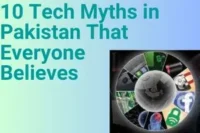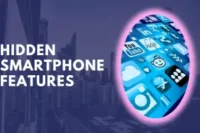10 Tech Myths in Pakistan That Everyone Believes-And the Surprising Truths Behind Them
Published: 05 Sep 2025
Technology is everywhere in our lives. Yet in Pakistan, many people still believe myths that simply are not true. From camera megapixels to freelancing jobs, these myths spread fast on social media and everyday conversations. The problem? They stop us from using technology the right way. In this article, we will bust the most common tech myths in Pakistan—and reveal the real truth behind them.
Why These Myths Persist
Tech myths in Pakistan don’t just appear out of nowhere.

They spread because of a mix of habits, culture, and lack of reliable information.
1. Local Markets
Walk into any electronics market, and you’ll hear sellers making bold claims. Some shopkeepers push products with fake promises just to make a sale. Over time, these sales tricks turn into “facts” that people keep repeating.
2. Social Media Misinformation
Facebook posts, WhatsApp forwards, and YouTube videos often spread half-truths. Many people trust these messages without checking the source. As a result, false tech beliefs spread faster than the truth.
3. Lack of Tech Literacy
A big reason myths survive is because many users don’t understand how technology really works. Without proper knowledge, it’s easy to believe that “more megapixels mean better pictures” or that “sleeping near a phone causes cancer.”
4. Cultural Assumptions
Sometimes, myths are tied to culture and daily life. For example, many families think freelancing is not a “real” job, simply because it doesn’t look like traditional office work. These cultural views make myths harder to break.
In short, these myths stay alive because people trust what they hear more than what they research. This makes tech awareness more important than ever in Pakistan. By breaking these myths, we can help people use technology smarter, safer, and with more confidence.
Myth vs Reality: The Main Section
Myth 1: “Made in China means fake”
Explanation: Many Pakistanis think if a product says “Made in China,” it must be fake or low quality. This belief comes from the fact that local markets often sell cheap copies.
Truth: Not everything made in China is fake. In fact, top brands like Apple, Lenovo, and Xiaomi manufacture their devices in China. The real issue is counterfeit products in markets, not the country itself.
Myth 2: “Freelancing isn’t real work”
Explanation: Some families believe freelancing is not a proper job because it doesn’t look like office work. People think it’s just “time pass” on a laptop.
Truth: Pakistan is one of the top freelancing countries in the world. Thousands of Pakistanis earn a full income online, often more than traditional jobs. Freelancing is a real profession that supports families and boosts the economy.
Myth 3: “NFC chips are tools for U.S. spying”
Explanation: Social media posts claim that NFC chips in phones or cards are spying devices used by foreign agencies.
Truth: NFC (Near Field Communication) is only a short-range technology. It is used for things like contactless payments and data sharing. It cannot spy on you in the way people imagine.
Myth 4: “Computer engineers can fix mechanical issues”
Explanation: People often think if someone is a computer engineer, they can fix any machine, even a broken fan or motor.
Truth: Computer engineers study coding, software, and systems—not mechanical repair. Fixing an electric fan or a car engine requires a different type of engineering.
Myth 5: “More megapixels = better camera”
Explanation: Many buyers believe that a higher megapixel number means better photo quality.
Truth: Picture quality depends on more than megapixels. Lens quality, sensor size, and image processing matter more. Even older phones with fewer megapixels, like the iPhone 6, still take clear and sharp photos.
Myth 6: “Wi-Fi (even password-protected) is safe”
Explanation: People feel secure once their Wi-Fi has a password. They think no one can break into it.
Truth: Older security systems like WEP can be hacked easily. Even modern systems like WPA2 need regular updates and strong passwords. Public Wi-Fi is especially risky and should be used carefully.
Myth 7: “Guessing your password is true hacking”
Explanation: Many believe that if someone guesses your password, they are a professional hacker.
Truth: Real hacking is more complex. Most accounts get hacked through phishing, weak security, or password reset tricks—not just simple guessing.
Myth 8: “More processor = faster computer”
Explanation: Some people think the more processors or cores a computer has, the faster it will be.
Truth: Speed depends on more than processors. RAM and storage speed (like SSDs instead of HDDs) often make a bigger difference in performance.
Myth 9: “Sleeping with your phone causes cancer”
Explanation: A common fear is that keeping a phone near your pillow at night can cause cancer.
Truth: No scientific study has proven this link. While it’s safe from a health view, it’s still better to keep your phone away during sleep to avoid distractions and reduce radiation exposure.
Myth 10: “Online games can be paused”
Explanation: Parents often think kids can pause online games at any time, like they pause a video.
Truth: Multiplayer games continue in real time. If a player leaves, the game goes on for others. This is why gamers get frustrated when told to “just pause the game.”
This section is powerful yet simple. Each myth is clear, easy to read, and debunked with plain words.
Bonus: New Myths to Know About
Technology is always changing, and so are the myths around it. In Pakistan, new tech trends have brought fresh misunderstandings. Let’s look at some common ones people are starting to believe.
Myth 11: “Using battery saver kills your battery health”
Explanation: Many people think switching on battery saver mode damages the battery or makes it weaker over time.
Truth: Battery saver is designed to extend usage by reducing background activity, brightness, and updates. It does not harm the battery. In fact, it helps your phone last longer during the day.
Myth 12: “Closing background apps saves more battery”
Explanation: A lot of smartphone users close apps again and again, thinking it will save battery.
Truth: Modern phones are smart. They freeze apps that are not in use. Constantly closing and reopening apps can actually use more power. The better option is to let the phone manage apps on its own.
Myth 13: “5G gives you cancer”
Explanation: Since the arrival of 5G news, some people believe it causes cancer or dangerous health effects. Social media has spread this fear worldwide, including in Pakistan.
Truth: Scientific research has found no link between 5G and cancer. 5G only uses radio waves, which are non-ionizing and not harmful to the human body. The myth comes from fear of new technology, not real science.
These new myths show how quickly misinformation spreads when technology changes. Busting them helps people trust modern tools instead of fearing them.
Why Believing These Myths Matters
At first, tech myths may look harmless. But in reality, they can cause big problems in everyday life.
1. Economic Loss
When people believe freelancing is not “real work,” they discourage young talent from trying it. This means many miss the chance to earn money online, even though Pakistan has huge potential in freelancing.
2. Security Risks
Thinking that Wi-Fi is always safe can put families and businesses in danger. Hackers can steal personal data, bank details, and private information if networks are not protected.
3. Tech Illiteracy
Believing myths like “more megapixels mean better photos” or “more processors mean faster computers” keeps people stuck with wrong ideas. This makes it hard for users to make smart choices when buying or using technology.
4. Perpetuating Stereotypes
Some myths, like “computer engineers can fix any machine,” create unfair expectations. They undervalue real expertise and confuse people about what different tech fields actually do.
The Bigger Picture
Believing myths stops Pakistan from growing in technology. It keeps users misinformed, limits opportunities, and even puts security at risk. The best way to fight this is simple: think critically, double-check facts, and trust credible sources.
By breaking these myths, we can build a smarter, safer, and more confident tech culture in Pakistan.
How to Avoid Falling for Tech Myths
The good news is that anyone can protect themselves from tech myths. It only takes a little care and the right habits. Here are some simple ways to avoid falling into the trap:
- Check reliable sources
Don’t believe every post, forward, or video you see online. Always confirm information from trusted websites, news outlets, or official brand pages. - Ask an expert
If you are unsure about a tech claim, talk to someone who works in IT, freelancing, or engineering. Experts can explain reality better than rumors. - Look for official guides
Most companies provide clear instructions on their websites. For example, phone makers explain how to charge batteries properly. Reading these guides can clear many doubts. - Join tech literacy efforts
Attend local workshops, follow reliable tech blogs, or join community groups that spread digital awareness. Learning together helps everyone grow smarter. - Think critically before sharing
If a piece of news sounds too shocking, it’s likely false. Always pause and verify before you share it with friends or family.
By practicing these steps, people in Pakistan can stop myths before they spread. A little awareness makes technology safer, more useful, and less confusing for everyone.
Conclusion
Tech myths are everywhere in Pakistan, from markets to living rooms. Some sound funny, but many cause real harm by wasting money, blocking career growth, and creating fear of new technology. The only way forward is awareness. When we check facts, ask questions, and learn from trusted sources, we break these myths for good. A smarter Pakistan is one where people use technology with confidence—not confusion.
FAQs
Tech myths in Pakistan are wrong ideas people believe about technology. For example, some think using a phone while charging will explode it, which is not true. These myths spread fast because many people trust what they hear instead of checking facts.
People believe them because of low tech knowledge, social media rumors, and word of mouth in local markets. When many people repeat the same thing, it feels true, even if it’s not. Lack of awareness makes it easy for myths to stay alive.
Yes, myths can waste time, money, and even harm security. For example, avoiding online banking due to fear of scams can stop people from using useful tools. Believing in wrong battery tips may also damage devices instead of protecting them.
Myths are everywhere, in villages and big cities too. In villages, people often rely on word of mouth. In cities, social media plays a big role in spreading false tech advice. Both places face the same problem of low fact-checking.
Some common myths are that closing apps saves more battery, using phones while charging is dangerous, and battery saver ruins your phone. These are not true, but many still believe them. Most modern phones are designed to handle these things safely.
Public Wi-Fi can be unsafe if you use it without care. But the myth that all Wi-Fi is dangerous is not true. With a VPN or secure websites, you can safely use Wi-Fi. The key is to protect your data, not avoid Wi-Fi fully.
Yes, some think 5G signals cause cancer or brain issues. This myth spread through fake news and social media. But science has no proof of 5G causing such harm. It is safe to use, just like older networks.
Myths stop people from trying new digital tools and online platforms. For example, fear of online payments makes freelancers lose work. Wrong ideas about the internet can keep people away from jobs and opportunities they could use.
The best way is to check official company websites or trusted tech blogs. You can also ask experts or join tech groups. Don’t believe every WhatsApp forward or YouTube video. Always double-check before you trust.
The best way is education and awareness. Schools, workshops, and local groups can spread real knowledge. People should learn to fact-check and share correct info. Step by step, we can break myths and make tech use stronger in Pakistan.

- Be Respectful
- Stay Relevant
- Stay Positive
- True Feedback
- Encourage Discussion
- Avoid Spamming
- No Fake News
- Don't Copy-Paste
- No Personal Attacks

- Be Respectful
- Stay Relevant
- Stay Positive
- True Feedback
- Encourage Discussion
- Avoid Spamming
- No Fake News
- Don't Copy-Paste
- No Personal Attacks





